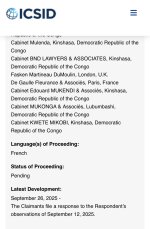Remark
Top 20
Cominière’s Latest Attempt to Obstruct ICC Arbitration Proceedings Dismissed
AVZ Minerals Limited (AVZ or Company) advises that the on 22 September 2025 the Arbitral Tribunal presiding over Case No. 27720/SP/ETT, acting under the aegis of the International Court of Arbitration of the International Chamber of Commerce (ICC), issued Procedural Order No. 7 comprehensively rejecting Cominière’s latest attempt to obstruct the arbitration. In its Second Request for Security for Costs, Cominière sought an order that the Claimants – AVZ International Pty Ltd (Australia), Dathcom Mining SA, and Green Lithium Holdings Pte Ltd – provide a €2 million guarantee and disclose confidential financing arrangements with Suzhou CATH Energy Technologies. The Tribunal found no basis for Cominière’s allegations of insolvency and lack of transparency, and moreover criticized Cominière’s failure to pay its own share of the ICC costs. This decision reinforces earlier findings in Procedural Order No. 2 (July 1, 2024), where the Tribunal had already rejected similar arguments from Cominière. AVZ welcomed the ruling, stating: “This is another procedural victory. The Tribunal has once again confirmed that Cominière’s tactics to delay and distract from the merits of the case have no place in this arbitration. AVZ remains focused on securing their rightful interests in the Manono Project and ensuring accountability.” This announcement was authorised for release by the board of directors of AVZ Minerals Limited.
https://static1.squarespace.com/sta...uncement+-+ICC+Dismisses+Cominiere+Action.pdf
AVZ Minerals Limited (AVZ or Company) advises that the on 22 September 2025 the Arbitral Tribunal presiding over Case No. 27720/SP/ETT, acting under the aegis of the International Court of Arbitration of the International Chamber of Commerce (ICC), issued Procedural Order No. 7 comprehensively rejecting Cominière’s latest attempt to obstruct the arbitration. In its Second Request for Security for Costs, Cominière sought an order that the Claimants – AVZ International Pty Ltd (Australia), Dathcom Mining SA, and Green Lithium Holdings Pte Ltd – provide a €2 million guarantee and disclose confidential financing arrangements with Suzhou CATH Energy Technologies. The Tribunal found no basis for Cominière’s allegations of insolvency and lack of transparency, and moreover criticized Cominière’s failure to pay its own share of the ICC costs. This decision reinforces earlier findings in Procedural Order No. 2 (July 1, 2024), where the Tribunal had already rejected similar arguments from Cominière. AVZ welcomed the ruling, stating: “This is another procedural victory. The Tribunal has once again confirmed that Cominière’s tactics to delay and distract from the merits of the case have no place in this arbitration. AVZ remains focused on securing their rightful interests in the Manono Project and ensuring accountability.” This announcement was authorised for release by the board of directors of AVZ Minerals Limited.
https://static1.squarespace.com/sta...uncement+-+ICC+Dismisses+Cominiere+Action.pdf



